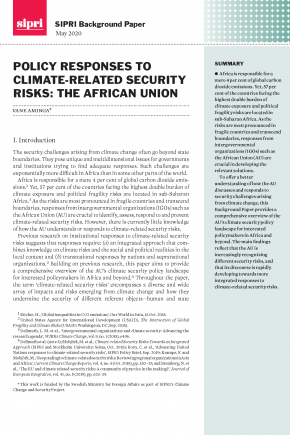Policy Responses to Climate-related Security Risks: The African Union
Africa is responsible for a mere 4 per cent of global carbon dioxide emissions. Yet, 57 per cent of the countries facing the highest double burden of climate exposure and political fragility risks are located in sub-Saharan Africa. As the risks are most pronounced in fragile countries and transcend boundaries, responses from intergovernmental organizations (IGOs) such as the African Union (AU) are crucial in developing the relevant solutions.
To offer a better understanding of how the AU discusses and responds to security challenges arising from climate change, this Background Paper provides a comprehensive overview of the AU’s climate security policy landscape for interested policymakers in Africa and beyond. The main findings reflect that the AU is increasingly recognizing different security risks, and that its discourse is rapidly developing towards more integrated responses to climate-related security risks.
I. Introduction
II. Overview of African Union structures and processes
III. Methodology
IV. Food security
V. Peace and security
VI. Human security
VII. Energy security and natural resource use crises
VIII. Conclusions

